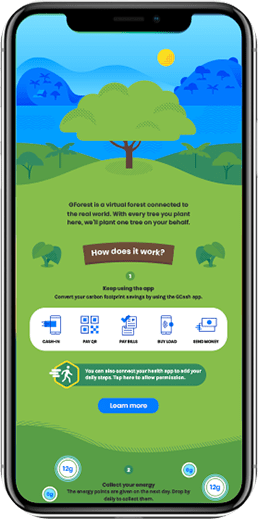GCash to plant 365,000 trees in Ipo Watershed in 2020


GCASH, operated by Globe Fintech Innovations Inc. (Mynt), has moved to adopt the Ipo Watershed by planting roughly 365,000 trees next year through the help of its users, as it aims to help prevent a repeat of the water crisis that Metro Manila has been facing for the past few months.
Tuesday night saw the mobile wallet launching GCash Forest, a new feature that gives account holders the ability to grow virtual trees through the app by doing simple tasks that lessen their carbon footprint such as walking, paying bills through their mobile phones and using recyclable materials, among others.
GCash, which partnered with World Wildlife Fund (WWF) and the Biodiversity Finance Initiative (Biofin) for this new feature, is creating a database of all virtually grown trees, and will then plant them at the Ipo Watershed in July 2020.
“This initiative is all about forest for water, water for agriculture and agriculture for food. It is very important that we rehabilitate our forests…and it is critical that we take care of this, since 50 percent of the Ipo Watershed is actually degraded,” WWF President Joel Palma said.
GCash Forest is inspired by its investor Ant Financial’s Ant Forest. In China, Ant Forest was able to entice Alipay users to join the greening movement, which has resulted in 100 million trees planted in the country’s arid regions.
“From our perspective, it’s how to get millions of Filipinos every day to do something small as part of their daily lifestyle,” Thomas said. “GCash Forest is about making it easier, more convenient, and even rewarding for everyone to take care of our environment for the benefit of future generations.”
Based on data from the Department of Environment and Natural Resources, the Philippines loses 47,000 hectares of forest cover annually.
“Many Filipinos, especially the younger ones, care about the environment, but a lot of them don’t know how they can actively take part in environmental protection. This is a barrier that GCash Forest addresses because they only need to use their smartphones—an already integral part of their daily lives—to make a difference,” Thomas said.






